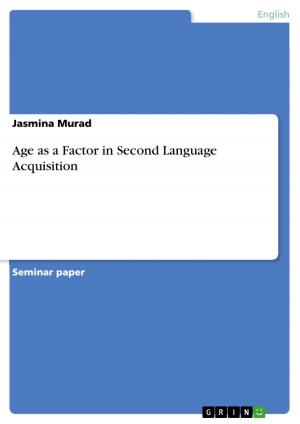Genitives and determiner phrases - Jan zijn boek vs John's book
Jan zijn boek vs John's book
Nonfiction, Entertainment, Drama, Anthologies| Author: | Stefanie Udema | ISBN: | 9783638860154 |
| Publisher: | GRIN Publishing | Publication: | November 18, 2007 |
| Imprint: | GRIN Publishing | Language: | English |
| Author: | Stefanie Udema |
| ISBN: | 9783638860154 |
| Publisher: | GRIN Publishing |
| Publication: | November 18, 2007 |
| Imprint: | GRIN Publishing |
| Language: | English |
Seminar paper from the year 2004 in the subject English Language and Literature Studies - Linguistics, grade: 2,0, University of Cologne (Englisches Seminar), 12 entries in the bibliography, language: English, abstract: The following paper deals with the genitive case in English language and the possessive construction in Dutch language referring to the examples Jan zijn boek as well as in English language John's book. In a first step there will be given a general definition on the term both genitive and determiner, with regards to the comparison of genitive case and determiner given in the topic of this paper. In this place, even clitic and affix definition is not left blank. Furthermore it is mentioned that during English language change from the Old English language to the Modern English language a change has taken place concerning the treatment of nominal phrases and determiner phrases within the DP-Analysis raised in the late 1980s. This will be pointed out in this paper as well. As well as the question whether a possessive construction can be treated as an inflectional form or even gets the status of a determiner there will be given a closer look to the history and use of the 's genitive and the his-genitive which usually applied in the second half of the 15th century. To get deeper into the discussion there will be a closer look to the position where the 's-construction do occur. Referring to cross linguistic reference the 's-genitive and other variations to point out a possessive relationship in Dutch language will be analysed more concrete. With reference to the DP-Hypothesis the change of the determiner status, i.e. the change of the 's-construction from the inflectional endings in Old English to clitic and in the end to determiner status are examined in this paper to give an overview how complex and investigated the 's-construction in English language is to this day.
Seminar paper from the year 2004 in the subject English Language and Literature Studies - Linguistics, grade: 2,0, University of Cologne (Englisches Seminar), 12 entries in the bibliography, language: English, abstract: The following paper deals with the genitive case in English language and the possessive construction in Dutch language referring to the examples Jan zijn boek as well as in English language John's book. In a first step there will be given a general definition on the term both genitive and determiner, with regards to the comparison of genitive case and determiner given in the topic of this paper. In this place, even clitic and affix definition is not left blank. Furthermore it is mentioned that during English language change from the Old English language to the Modern English language a change has taken place concerning the treatment of nominal phrases and determiner phrases within the DP-Analysis raised in the late 1980s. This will be pointed out in this paper as well. As well as the question whether a possessive construction can be treated as an inflectional form or even gets the status of a determiner there will be given a closer look to the history and use of the 's genitive and the his-genitive which usually applied in the second half of the 15th century. To get deeper into the discussion there will be a closer look to the position where the 's-construction do occur. Referring to cross linguistic reference the 's-genitive and other variations to point out a possessive relationship in Dutch language will be analysed more concrete. With reference to the DP-Hypothesis the change of the determiner status, i.e. the change of the 's-construction from the inflectional endings in Old English to clitic and in the end to determiner status are examined in this paper to give an overview how complex and investigated the 's-construction in English language is to this day.















